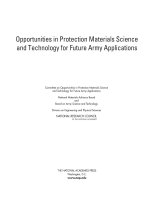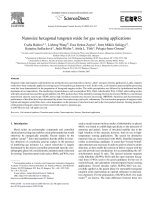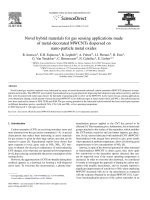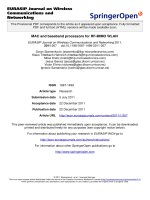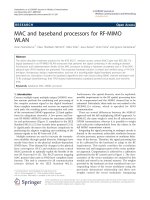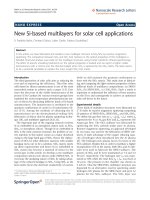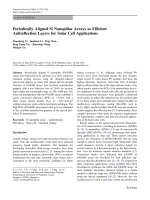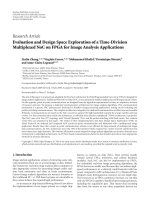microstrip filters for rf microwave applications
Bạn đang xem bản rút gọn của tài liệu. Xem và tải ngay bản đầy đủ của tài liệu tại đây (8.97 MB, 476 trang )
Microstrip Filters
for RF/Microwave
Applications
Microstrip Filters for RF/Microwave Applications. Jia-Sheng Hong, M. J. Lancaster
Copyright © 2001 John Wiley & Sons, Inc.
ISBNs: 0-471-38877-7 (Hardback); 0-471-22161-9 (Electronic)
Microstrip Filters
for RF/Microwave
Applications
JIA-SHENG HONG
M. J. LANCASTER
A WILEY-INTERSCIENCE PUBLICATION
JOHN WILEY & SONS, INC.
NEW YORK / CHICHESTER / WEINHEIM / BRISBANE / SINGAPORE / TORONTO
Designations used by companies to distinguish their products are often claimed as trademarks. In all instances
where John Wiley & Sons, Inc., is aware of a claim, the product names appear in initial capital or ALL CAPITAL
LETTERS. Readers, however, should contact the appropriate companies for more complete information regarding
trademarks and registration.
Copyright © 2001 by John Wiley & Sons, Inc. All rights reserved.
No part of this publication may be reproduced, stored in a retrieval system or transmitted in any form or by any means, electronic
or mechanical, including uploading, downloading, printing, decompiling, recording or otherwise, except as permitted under
Sections 107 or 108 of the 1976 United States Copyright Act, without the prior written permission of the Publisher. Requests to
the Publisher for permission should be addressed to the Permissions Department, John Wiley & Sons, Inc., 605 Third Avenue,
New York, NY 10158-0012, (212) 850-6011, fax (212) 850-6008, E-Mail: PERMREQ @ WILEY.COM.
This publication is designed to provide accurate and authoritative information in regard to the
subject matter covered. It is sold with the understanding that the publisher is not engaged in
rendering professional services. If professional advice or other expert assistance is required, the
services of a competent professional person should be sought.
ISBN 0-471-22161-9
This title is also available in print as ISBN 0-471-38877-7.
For more information about Wiley products, visit our web site at www.Wiley.com.
Contents
Preface xi
1. Introduction 1
2. Network Analysis 7
2.1 Network Variables 7
2.2 Scattering Parameters 8
2.3 Short-Circuit Admittance Parameters 11
2.4 Open-Circuit Impedance Parameters 11
2.5 ABCD Parameters 12
2.6 Transmission Line Networks 12
2.7 Network Connections 14
2.8 Network Parameter Conversions 17
2.9 Symmetrical Network Analysis 18
2.10 Multi-Port Networks 21
2.11 Equivalent and Dual Networks 24
2.12 Multi-Mode Networks 26
References 28
3. Basic Concepts and Theories of Filters 29
3.1 Transfer Functions 29
3.1.1 General Definitions 29
3.1.2 The Poles and Zeros on the Complex Plane 30
3.1.3 Butterworth (Maximally Flat) Response 31
3.1.4 Chebyshev Response 32
3.1.5 Elliptic Function Response 34
3.1.6 Gaussian (Maximally Flat Group-Delay) Response 36
v
3.1.7 All-Pass Response 37
3.2 Lowpass Prototype Filters and Elements 38
3.2.1 Butterworth Lowpass Prototype Filters 41
3.2.2 Chebyshev Lowpass Prototype Filters 41
3.2.3 Elliptic Function Lowpass Prototype Filters 44
3.2.4 Gaussian Lowpass Prototype Filters 46
3.2.5 All-Pass Lowpass Prototype Filters 47
3.3 Frequency and Element Transformations 48
3.3.1 Lowpass Transformation 49
3.3.2 Highpass Transformation 51
3.3.3 Bandpass Transformation 51
3.3.4 Bandstop Transformation 53
3.4 Immittance Inverters 54
3.4.1 Definition of Immittance, Impedance and Admittance Inverters 54
3.4.2 Filters with Immittance Inverters 56
3.4.3 Practical Realization of Immittance Inverters 60
3.5 Richards’ Transformation and Kuroda Identities 61
3.5.1 Richards’ Transformation 61
3.5.2 Kuroda Identities 66
3.5.3 Coupled-Line Equivalent Circuits 66
3.6 Dissipation and Unloaded Quality Factor 69
3.6.1 Unloaded Quality Factors of Lossy Reactive Elements 70
3.6.2 Dissipation Effects on Lowpass and Highpass Filters 71
3.6.3 Dissipation Effects on Bandpass and Bandstop Filters 73
References 75
4. Transmission Lines and Components 77
4.1 Microstrip Lines 77
4.1.1 Microstrip Structure 77
4.1.2 Waves in Microstrip 77
4.1.3 Quasi-TEM Approximation 78
4.1.4 Effective Dielectric Constant and Characteristic Impedance 78
4.1.5 Guided Wavelength, Propagation Constant, Phase
4.1.5 Velocity, and Electrical Length 80
4.1.6 Synthesis of W/h 80
4.1.7 Effect of Strip Thickness 81
4.1.8 Dispersion in Microstrip 82
4.1.9 Microstrip Losses 83
4.1.10 Effect of Enclosure 84
4.1.11 Surface Waves and Higher-Order Modes 84
4.2 Coupled Lines 84
4.2.1 Even- and Odd-Mode Capacitances 85
4.2.2 Even- and Odd-Mode Characteristic Impedances and Effective
4.1.5 Dielectric Constants 87
4.2.3 More Accurate Design Equations 87
vi
CONTENTS
4.3 Discontinuities and Components 89
4.3.1 Microstrip Discontinuities 89
4.3.2 Microstrip Components 93
4.3.3 Loss Considerations for Microstrip Resonators 102
4.4 Other Types of Microstrip Lines 104
References 106
5. Lowpass and Bandpass Filters 109
5.1 Lowpass Filters 109
5.1.1 Stepped-Impedance L-C Ladder Type Lowpass Filters 109
5.1.2 L-C Ladder Type of Lowpass Filters using Open-Circuited Stubs 112
5.1.3 Semilumped Lowpass Filters Having Finite-Frequency
5.1.3 Attenuation Poles 116
5.2 Bandpass Filters 121
5.2.1 End-Coupled, Half-Wavelength Resonator Filters 121
5.2.2 Parallel-Coupled, Half-Wavelength Resonator Filters 127
5.2.3 Hairpin-Line Bandpass Filters 129
5.2.4 Interdigital Bandpass Filters 133
5.2.5 Combline Filters 142
5.2.6 Pseudocombline Filters 148
5.2.7 Stub Bandpass Filters 151
References 158
6. Highpass and Bandstop Filters 161
6.1 Highpass Filters 161
6.1.1 Quasilumped Highpass Filters 161
6.1.2 Optimum Distributed Highpass Filters 165
6.2 Bandstop Filters 168
6.2.1 Narrow-Band Bandstop Filters 168
6.2.2 Bandstop Filters with Open-Circuited Stubs 176
6.2.3 Optimum Bandstop Filters 182
6.2.4 Bandstop Filters for RF Chokes 188
References 190
7. Advanced Materials and Technologies 191
7.1 Superconducting Filters 191
7.1.1 Superconducting Materials 191
7.1.2 Complex Conductivity of Superconductors 192
7.1.3 Penetration Depth of Superconductors 193
7.1.4 Surface Impedance of Superconductors 194
7.1.5 Nonlinearity of Superconductors 197
7.1.6 Substrates for Superconductors 199
7.1.7 HTS Microstrip Filters 200
7.1.8 High-Power HTS Filters 201
7.2 Ferroelectric Tunable Filters 204
CONTENTS
vii
7.2.1 Ferroelectric Materials 205
7.2.2 Dielectric Properties 206
7.2.3 Tunable Microstrip Filters 208
7.3 Micromachined Filters 211
7.3.1 MEMS and Micromachining 211
7.3.2 Micromachined Microstrip Filters 211
7.4 MMIC Filters 215
7.4.1 MMIC Technology 215
7.4.2 MMIC Microstrip Filters 216
7.5 Active Filters 217
7.5.1 Active Filter Methodologies 217
7.5.2 Active Microstrip Filters 219
7.6 Photonic Bandgap (PBG) Filters 221
7.6.1 PBG Structures 221
7.6.2 PBG Microstrip Filters 222
7.7 Low-Temperature Cofired Ceramic (LTCC) Filters 224
7.7.1 LTCC Technology 224
7.7.2 Miniaturized LTCC Filters 225
References 227
8. Coupled Resonator Circuits 235
8.1 General Coupling Matrix for Coupled-Resonator Filters 236
8.1.1 Loop Equation Formulation 236
8.1.2 Node Equation Formulation 240
8.1.3 General Coupling Matrix 243
8.2 General Theory of Couplings 244
8.2.1 Synchronously Tuned Coupled-Resonator Circuits 245
8.2.2 Asynchronously Tuned Coupled-Resonator Circuits 251
8.3 General Formulation for Extracting Coupling Coefficient k 257
8.4 Formulation for Extracting External Quality Factor Q
e
258
8.4.1 Singly Loaded Resonator 259
8.4.2 Doubly Loaded Resonator 262
8.5 Numerical Examples 264
8.5.1 Extracting k (Synchronous Tuning) 265
8.5.2 Extracting k (Asynchronous Tuning) 267
8.5.3 Extracting Q
e
270
References 271
9. CAD for Low-Cost and High-Volume Production 273
9.1 Computer-Aided Design Tools 274
9.2 Computer-Aided Analysis 274
9.2.1 Circuit Analysis 274
9.2.2 Electromagnetic Simulation 279
9.2.3 Artificial Neural Network Modeling 283
viii
CONTENTS
9.3 Optimization 285
9.3.1 Basic Concepts 285
9.3.2 Objective Functions for Filter Optimization 286
9.3.3 One-Dimensional Optimization 288
9.3.4 Gradient Methods for Optimization 288
9.3.5 Direct Search Optimization 291
9.3.6 Optimization Strategies Involving EM Simulations 295
9.4 Filter Synthesis by Optimization 299
9.4.1 General Description 299
9.4.2 Synthesis of a Quasielliptic Function Filter by Optimization 299
9.4.3 Synthesis of an Asynchronously Tuned Filter by Optimization 300
9.4.4 Synthesis of a UMTS Filter by Optimization 302
9.5 CAD Examples 306
References 312
10. Advanced RF/Microwave Filters 315
10.1 Selective Filters with a Single Pair of Transmission Zeros 315
10.1.1 Filter Characteristics 315
10.1.2 Filter Synthesis 317
10.1.3 Filter Analysis 320
10.1.4 Microstrip Filter Realization 321
10.2 Cascaded Quadruplet (CQ) Filters 325
10.2.1 Microstrip CQ Filters 326
10.2.2 Design Example 326
10.3 Trisection and Cascaded Trisection (CT) Filters 328
10.3.1 Characteristics of CT Filters 328
10.3.2 Trisection Filters 331
10.3.3 Microstrip Trisection Filters 335
10.3.4 Microstrip CT Filters 340
10.4 Advanced Filters with Transmission Line Inserted Inverters 341
10.4.1 Characteristics of Transmission Line Inserted Inverters 341
10.4.2 Filtering Characteristics with Transmission Line Inserted Inverters 344
10.4.3 General Transmission Line Filter 348
10.5 Linear Phase Filters 350
10.5.1 Prototype of Linear Phase Filter 350
10.5.2 Microstrip Linear Phase Bandpass Filters 355
10.6 Extract Pole Filters 359
10.6.1 Extracted Pole Synthesis Procedure 360
10.6.2 Synthesis Example 366
10.6.3 Microstrip Extracted Pole Bandpass Filters 368
10.7 Canonical Filters 371
10.7.1 General Coupling Structure 371
10.7.2 Elliptic Function/Selective Linear Phase Canonical Filters 373
References 375
CONTENTS
ix
11. Compact Filters and Filter Miniaturization 379
11.1 Ladder Line Filters 379
11.1.1 Ladder Microstrip Line 379
11.1.2 Ladder Microstrip Line Resonators and Filters 381
11.2 Pseudointerdigital Line Filters 383
11.2.1 Filtering Structure 383
11.2.2 Pseudointerdigital Resonators and Filters 385
11.3 Miniature Open-Loop and Hairpin Resonator Filters 389
11.4 Slow-Wave Resonator Filters 392
11.4.1 Capacitively Loaded Transmission Line Resonator 392
11.4.2 End-Coupled Slow-Wave Resonator Filters 396
11.4.3 Slow-Wave, Open-Loop Resonator Filters 396
11.5 Miniature Dual-Mode Resonator Filters 404
11.5.1 Microstrip Dual-Mode Resonators 404
11.5.2 Miniaturized Dual-Mode Resonator Filters 408
11.6 Multilayer Filters 410
11.6.1 Wider-Band Multilayer Filters 411
11.6.2 Narrow-Band Multilayer Filters 412
11.7 Lumped-Element Filters 420
11.8 Miniaturized Filters Using High Dielectric Constant Substrates 426
References 428
12. Case Study for Mobile Communications Applications 433
12.1 HTS Subsystems and RF Modules for Mobile Base Stations 433
12.2 HTS Microstrip Duplexers 436
12.2.1 Duplexer Principle 438
` 12.2.2 Duplexer Design 439
12.2.3 Duplexer Fabrication and Test 444
12.3 Preselect HTS Microstrip Bandpass Filters 446
12.3.1 Design Considerations 446
12.3.2 Design of the Preselect Filter 448
12.3.3 Sensitivity Analysis 448
12.3.4 Evaluation of Quality Factor 450
12.3.5 Filter Fabrication and Test 454
References 456
Appendix: Useful Constants and Data 459
Index 461
x
CONTENTS
Preface
Filters play important roles in many RF/microwave applications. Emerging applica-
tions such as wireless communications continue to challenge RF/microwave filters
with ever more stringent requirements—higher performance, smaller size, lighter
weight, and lower cost. The recent advances in novel materials and fabrication tech-
nologies, including high-temperature superconductors (HTS), low-temperature
cofired ceramics (LTCC), monolithic microwave integrated circuits (MMIC), mi-
croelectromechanic system (MEMS), and micromachining technology, have stimu-
lated the rapid development of new microstrip and other filters for RF/microwave
applications. In the meantime, advances in computer-aided design (CAD) tools
such as full-wave electromagnetic (EM) simulators have revolutionized filter de-
sign. Many novel microstrip filters with advanced filtering characteristics have been
demonstrated. However, up until now there has not been a single book dedicated to
this subject.
Microstrip Filters for RF/Microwave Applications offers a unique and compre-
hensive treatment of RF/microwave filters based on the microstrip structure, provid-
ing a link to applications of computer-aided design tools and advanced materials
and technologies. Many novel and sophisticated filters using computer-aided design
are discussed, from basic concepts to practical realizations. The book is self-con-
tained—it is not only a valuable design resource but also a handy reference for stu-
dents, researchers, and engineers in microwave engineering. It can also be used for
RF/microwave education.
The outstanding features of this book include discussion of many novel mi-
crostrip filter configurations with advanced filtering characteristics, new design
techniques, and methods for filter miniaturization. The book emphasizes computer
analysis and synthesis and full-wave electromagnetic (EM) simulation through a
large number of design examples. Applications of commercially available software
are demonstrated. Commercial applications are included as are design theories and
xi
methodologies, which are not only for microstrip filters, but also directly applicable
to other types of filters, such as waveguide and other transmission line filters.
Therefore, this book is more than just a text on microstrip filters.
Much of work described herein has resulted from the authors’ research. The au-
thors wish to acknowledge the financial support of the UK EPSRC and the Euro-
pean Commission through the Advanced Communications Technologies and Ser-
vices (ACTS) program. They would also like to acknowledge their national and
international collaborators, including Professor Heinz Chaloupka at Wuppertal Uni-
versity (Germany), Robert Greed at Marconi Research Center (U.K.), Dr. Jean-
Claude Mage at Thomson-CSF/CNRS (France), and Dieter Jedamzik, formerly
with GEC-Marconi Materials Technology (U.K.).
The authors are indebted to many researchers for their published works, which
were rich sources of reference. Their sincere gratitude extends to the Editor of the
Wiley Series in Microwave and Optical Engineering, Professor Kai Chang; the Ex-
ecutive Editor of Wiley-Interscience, George Telecki; and the reviewers for their
support in writing the book. The help provided by Cassie Craig and other members
of the staff at Wiley is most appreciated. The authors also wish to thank their col-
leagues at the University of Birmingham, including Professor Peter Hall, Dr. Fred
Huang, Dr. Adrian Porch, and Dr. Peter Gardener.
In addition, Jia-Sheng Hong would like to thank Professor John Allen at the Uni-
versity of Oxford (U.K.), Professor Werner Wiesbeck at Kalsruhe University (Ger-
many), and Dr. Nicholas Edwards at British Telecom (U.K.) for their many years of
support and friendship. Professor Joseph Helszajn at Heriot-Watt University (U.K.),
who sent his own book on filters to Jia-Sheng Hong, is also acknowledged.
Finally, Jia-Sheng Hong would like to express his deep appreciation to his wife,
Kai, and his son, Haide, for their tolerance and support, which allowed him to write
the book at home over many evenings, weekends, and holidays. In particular, with-
out the help of Kai, completing this book on time would not have been possible.
xii
PREFACE
Amplifiers, 188
Amplitudes, 9
Analytical models, 276
Anisotropic permittivity, 390
Anisotropy, 200
ANN, see Artificial neural network
Antenna
mast, 434
port, 444
Aperture couplings, 413
Approximation
lumped-element capacitor, 110
lumped-element inductor, 110
problem, 30
Arithmetic mean, 257
Artificial material, 221
Artificial neural network (ANN), 283
architecture, 284
configuration, 284
hidden layer, 284
input layer, 284
models, 284
output layer, 284
Asymmetric coupled lines, 135
Asymmetrical frequency response, 330
Asynchronous tuning, 239
Asynchronously tuned coupled-resonator circuits,
251
Asynchronously tuned filter, 239, 300, 252
Attenuation constant, 83
Autonomy, 434
Bandpass filter(s), 52, 121–158
using immittance inverters, 57–60
Bandpass transformation, 51
CHAPTER ONE
Index
461
ABCD matrix, 12
admittance inverter, 56
impedance inverter, 55
line subnetwork, 276
normalized, 361
step subnetwork, 276
unit element, 65
ABCD parameters, 12
coupled-line subnetwork, 277
two-port networks, 13
Activation function, 285
Active circuit, 218
Active filters, 217
Actuation, 211
Adjacent resonators, 331
Admittance inverter, 34, 246, 255
Admittance matrix, 11
normalized, 241
Advanced RF/microwave filters, 315–375
Aggressive space mapping, 298
Air-wound inductors, 420
Algorithm
direct search, 292
genetic, 294
gradient-based optimisation, 290
one-dimensional optimisation, 289
All-pass network, 37
C-type sections, 38
D-type sections, 38
lowpass prototype, 47
external delay equalizer, 350
All-pole filter(s), 33, 40
All-thin-film assembly, 420
Alumina substrate, 210
Ambient temperature, 435
Bandstop filter(s), 53, 168–190
HTS bandstop filter, 441
with open-circuited stubs, 176
Bandstop transformation, 53
Barium strontium titanate, 205
Baseband signal, 10
Batch-processing, 211
Bends, 92
Bessel filters, 36
Bias network, 188
Bias T, 188
Bias voltages, 205
Biquadratic equation, 253, 257
Boiling point, 192
Bondwires, 435
Boundary conditions, 393
Branch line coupler, 440
Buffer layer, 199
Bulk crystal, 208
Bulk micromachining, 211
Butterworth (Maximally flat) response, 31
Butterworth lowpass prototype, 41
Bypass relays, 436
CAA model, 299
CAD
example(s), 302, 306–311
technique, 282
tools, 274
Call clarity, 434
Canonical filters, 371. See also Advanced
RF/microwave filters
Canonical form, 371
Capacitance per unit length, 78
Capacitively loaded transmission line(s), 381
resonator, 392
Cascade connection, 15
Cascaded couplings, 371
Cascaded network, 275
Cascaded quadruplet (CQ) filters, 325. See also
Advanced RF/microwave filters
Cascaded trisection (CT) filters, 328.
Cauer filters, 35
Cavity modes, 100
Cell size, 282
Cells, 279
Cellular basestation application, 433
Cellular communication, 200
Ceramic combline filters, 235
Ceramics, 211
Chain matrix, 12
Channelized active filters, 218
Characteristic admittance(s), 56, 122
Characteristic impedance(s), 14, 55, 78, 110
462
INDEX
Chebyshev
filter(s), 33, 446
function(s), 33, 166, 184
lowpass prototype, 41–43
response, 32
Chemical vapor deposition, 212
Chip capacitors, 420
Circuit
analyses, 274
laws, 236
models, 282
Circular disk resonator, 204
Circular spiral inductor, 95
Closed-form expressions
coupled microstrip lines, 85–89
microstrip discontinuities, 89–92
microstrip lines, 79–54
C-mode impedances, 136
Coarse model, 295
Coarse model, 310
Cold finger, 435
Combline, see also Pseudocombline filter
filters, 142, 226
resonators, 145
Commensurate network, 165
Commensurate-length, 61
Communication satellites, 204
Compact filters, 379–428. See also Advanced
RF/microwave filters
Compensations, 119
Complex amplitudes, 7
Complex conductivity, 192
Complex conjugate symmetry, 360
Complex frequency variable, 30
Complex permittivity, 103
Complex plane zeros, 351
Complex plane, 30
Complex propagation constant, 14
Complex transmission zeros, 353
Composite network, 276
Compressor, 435
Computational time, 282
Computer
memory, 282
optimization, 273
simulation, 273
synthesis, 318
Computer-aided analysis (CAA), 275
Computer-aided design (CAD), 273
Conductivity, 197
Conductor loss, 81, 83
Conductor Q, 103
Connection of multi-mode networks, 27
Constrains, 286
Convergence analysis, 279
Convergent simulation, 282
Cooler, 435
Coplanar waveguide (CPW), 213
Cost function, 285
Cost-effective factor, 273
Coupled energy, 244
Coupled microstrip lines, 84, 128
Coupled resonator circuits, 235–271
Coupled resonator filters, 235–244. See also
Advanced RF/microwave filters
Coupled RF/microwave resonators, 245
Coupled-line
network, 66
subnetworks, 277
Coupling capacitances, 124
Coupling coefficient(s), 129, 241, 320
normalized, 238
Coupling gaps, 124
Coupling matrix, 236, 299
Critical current density, 198
Critical field, 198
Critical temperature, 191
Cross coupling, 201, 317, 325, 351, 371
Cross-coupled double array network, 359
Cryogenic/RF interconnection, 435
Crystal axis, 200
Crystalline, 205
lattice, 199
Curie temperature, 205
Current law, 240
Curve-fitting techniques, 285
Cutoff, 165
angular frequency, 40
frequency, 110
dc block, 161
Decibels (dB), 9
per unit length, 83
Decomposed model, 311
Decomposition design, 311
De-embedding, 124
Defects, 199
Definite nodal admittance matrix, 255
Degenerate modes, 100, 406
Delay, 9
characteristic, 350
Deposition, 211
Derivatives, 288
Design
curves, 131
space, 286
Designable parameters, 285
INDEX 463
Determinant, 256
Dielectric
loss, 83
loss tangent, 103, 199
membranes, 211
properties, 206
substrate, 77, 278
Dielectric Q, 103
Dielectric resonator filters, 235
Digital mobile communication system, 201
Dipole moment, 205
Direct search methods, 291
Directional couplers, 440
Discontinuities, 119
Disk dual-mode resonator, 102
Dispersion
effect, 396
equation, 395
in microstrip, 82
Dissipation, 69
effects, 71
Dissipative losses, 210
Distributed circuits, 57
Distributed element, 65
Distributed filter, 61. See also Filter
Distributed line resonators, 100
Diversity, 434
Dominant mode, 78
Doppler effects, 210
Doubly loaded resonator, 262
Dropped calls, 434
Dual networks, 25
Dual-mode filter(s), 100, 204. See also Compact
filters
Dual-mode resonators, 407
Duplexers, 433
Dynamic channel allocation, 205
Edge-coupled half-wavelength resonator filter,
307
Edge-coupled microstrip bandpass filters, 127
Effect of strip thickness, 81
Effective conductivity, 103
Effective dielectric constant, 78
Effective dielectric Permittivity, 78
Eigenequation, 253–254, 394
Eigenfrequencies, 252
Eigenvalues, 253–254
Electric and magnetic fields, 77
Electric aperture coupling, 418
Electric coupling, 245, 324
Electric coupling coefficient, 247, 253
Electric discharge, 204
Electric wall, 85, 247
Electrical length(s), 61, 80, 123, 165
Electrical short-circuit, 383
Electrical tunability, 210
Electromagnetic (EM) simulation(s), 112, 124,
273, 279, 310, 322,441
Electromagnetic (EM) waves, 1
Electromagnetic analysis, 282
Electromagnetic coupling, 278
Electromagnetic crystal structures (ECS), 221
Electromagnetic waves in free space, 78
Electron-beam
evaporation, 210
lithography, 216
Electronic packaging, 224
Electronically tunable filters, 205
Element transformation, 48–54
Element values
Butterworth, 41
Chebyshev, 42–43
elliptic, 45
Gaussian, 46
Elliptic function(s), 86
filter(s), 35, 446
lowpass filter, 117
lowpass prototype, 44
response, 34, 117, 373
Elliptical deformation, 204
EM simulation(s), see Electromagnetic
simulation(s)
EM solver, 274
End-coupled half-wavelength resonator filters,
121
End-coupled slow-wave resonators filters, 396
Envelope delay, 10
Equal-ripple
passband, 32
stopband, 35
Equivalent networks, 24
Error function, 285
Etchant, 213
Ethylene diamine pyrocatechol (EDP), 213
Evaluation of quality factor, 450
Even- and odd-mode
capacitances, 85
characteristic impedances, 128
Even mode, 84, 278, see also Odd mode
excitation, 136
networks, 18
Even excitation, 18
Evolutionary process, 293
External delay equalizer, 350
External quality factor(s), 129, 241, 261, 238,
320
464
INDEX
Extracted pole
filters, 359. See also Advanced RF/microwave
filters
synthesis, 359
Extracting coupling coefficient, 257
Extracting external quality Factor, 258
Feasible solution, 286
Feed line, 258
Feedback, 218
Ferroelectric(s), 204
materials, 205
thin films, 205
Field vectors, 244
Filter, see also Advanced RF/microwave filters,
Bandpass filters, Bandstop filters,
Compact filters, Highpass filters,
Lowpass filters
analysis, 320
miniaturization, 379. See also Compact filters
networks, 7
synthesis by optimization, 299
topology, 299
tuning, 448
Filtering characteristic(s), 244, 344
Filtering function, 165, 182
Fine model, 295, 310
Finite frequency attenuation poles, 117, 316
Finite frequency zeros, 351
Finite-difference time-domain method (FDTD),
279
Finite-element method (FEM), 279
Finite-frequency transmission zeros, 31
First order approximation, 290
Flat group delay, 350
Floquet’s theorem, 395
Fractal dual-mode resonator, 410
Fractional bandwidth, 51, 123, 178, 237
Frequency
agile filters, 205
agility, 205
bands, 1
hopping, 210
invariant immittance inverter(s), 56, 332, 350
invariant susceptance, 332
mapping, 48, 64, 168, 177
spectrums, 1
transformation, 48–54
tuning, 175, 450
Frequency-dependent couplings, 420
Frequency-dependent effective dielectric
constant, 82
Fringe capacitance, 86
Fringe fields, 265
Full-wave EM simulation(s), see
Electromagnetic simulation(s)
Gain blocks, 218
Gallium arsenide (GaAs), 211
substrate(s), 212, 215
wafers, 213
Gaps, 91
Gaussian response, 36
Gaussian lowpass prototype, 46
General coupling matrix, 243, 373
Generalized scattering matrix, 27
Generalized Y and Z matrices, 27
Genetic algorithm (GA), 291
Genetic operators, 293
Geometric mean, 257
Gifford McMahon coolers, 435
Global minimum, 286
Global system for mobile communication system,
435
Golden section method, 288
Gradient vector, 289
Gradient-based optimization, 288
Grounding, 134
Group delay, 30, 261
equalization, 353. See also All-pass network
equalizers, 37
response(s), 30, 419
self-equalization, 326. See also Advanced
RF/microwave filters
variation, 287
Guided wavelength, 80
Guided-wave media, 77
g-values, 40
Hairpin-comb filter, 200. See also Bandpass
filters
Hairpin resonator, 129. See also Compact filters
Half-wavelength line resonators, 100, 127
Harmonic generation, 199
Harmonic pass bands, 165
Heat lift, 435
Heat load, 435
Heating, 202
HEMT (high electron mobility transistor), 221
Hermetic package, 224
Hessian matrix, 289
High- and low-impedance lines, 110
High dielectric constant substrates, 426. See also
Compact filters, LTCC filters
High temperature superconductors (HTS), 191
High volume production, 273
High-capacity communication systems, 353
Higher-order modes, 84
INDEX 465
High-impedance line(s), 97, 117
Highpass
filters, 161–169
transformation, 51
High-power applications, 201
High-temperature cofired ceramics (HTCC), 224
Housing loss, 83
Housing Q, 104
HTS
films, 192
microstrip filters, 200–204
microstrip duplexers, 436
subsystems, 433
thin films, 200
Hurwitz polynomial, 31
Hybrids, 438
I/O coupling structures, 258
Ideal admittance inverter, 55
Ideal impedance inverters, 55
Identity matrix, 243
Immittance, see also Admittance, Impeadance
inverter(s), 54, 170
inverter parameters, 56
Impedance
inverter(s), 54, 255
matching, 10
matrix, 237
scaling, 49
Implants, 222
Impurity, 199
Incident waves, 8
Incident wave power, 8
Induced voltages, 278
Inductance, 110
Inductive line, 190
Infrared, 1
Initial conditions, 278
Initial values, 300
Input impedance, 10, 12
Input/output (I/O), 134
Insertion loss, 9
response, 30
Integral equation (boundary-element) method
(IE/BEM), 279
Integrated circuit (IC), 211
Interdigital bandpass filter, 133, 309. See also
Bandpass filters, Pseudointerdigital
bandpass filter
Interdigital capacitor(s), 94, 96, 163, 216
Interference
rejection, 434
suppression, 205
Intermodulation, 199
Interpolation, 125
Intrinsic resistance, 191
Ion-milling, 200
Ions, 205
Isolation, 444
J-inverters, 56, 122
K-connectors, 435
K-inverters, 55
Kuroda identities, 66, 178
Ladder line
filters, 379. See also Compact filters
resonator, 381
Ladder structure, 320
Ladder-type lowpass prototype, 122
Lamination, 224
Lanthanum aluminate (LaAlO3 or LAO), 199
Laser ablation, 206
Layout, 112. See also Filters
L-C ladder type, 110
Least pth approximation, 287
Least square objective function, 287
Lift-off process, 201
Lightening protection, 436
Linear circuit simulator, 274
Linear distortion, 326
Linear phase, see also Group delay
bandpass filters, 355
filters, 350
response, 353
Linear simulation(s), 274–275
Liquid nitrogen, 192, 444
Lithographic patterning, 211
Local minimum, 286
London penetration depth, 194
Loop, see also Coupled resonator circuits
current, 236
equations, 236
inductors, 216
Loss tangent(s), 83, 205, 207
Lossless network, 11
Lossless passive network, 10, 22
Lossy capacitor, 70
Lossy elements, 69
Lossy inductor, 70
Lossy resonators, 70
Low cost, 273
Low noise amplifiers (LNAs), 434
Low-impedance line(s), 97, 117
Lowpass
filters, 109
prototype (s), 29, 109, 161, 317
466
INDEX
prototype filter, 38, 332
transformation, 49
Low-temperature cofired ceramic (LTCC), 224
L-shape resonators, 174
LTCC
filters, 225
materials, 225
Lumped inductors and capacitors, 93
Lumped L-C elements, 113
Lumped resonators, 57
Lumped-element
immittance inverters, 61
microwave filters, 420
resonators, 100
Magesium oxide (MgO), 199
Magnetic aperture coupling, 418
Magnetic coupling, 245, 324
coefficient, 249, 255
Magnetic loss, 83
Magnetic substrates, 83
Magnetic wall, 85, 247
Mass production, 199
Materials, 191
Maximally flat group delay, 36. See also Group
delay
Maximally flat stopband, 32
Maximization problem, 285
Maxwell’s equations, 279
Meander open-loop resonators, 201, 389
Mechanical structures, 211
Membrane-based circuits, 213
MEMS, 211
Mesh sizes, 279
Metal-insulator-metal (MIM) capacitor, 94
Metallic enclosure, 84
Metallization, 210
Metallized cavity, 212
Metals, 211
Method of moments (MoM), 279
Microelectromechanical system (MEMS), 211
Micromachined bandpass filter, 213
Micromachined filters, 211, 235
Microstrip
bandpass filter, 121–158, 277
bandstop filter(s), 168–190, 441
components, 93
CT filters, 340
discontinuities, 89
dual-mode resonators, 404
extracted pole bandpass filters, 368
gap(s), 124
highpass filter, 161–168
lines, 77
losses, 83
lowpass filters, 109–121
realization, 114
resonator(s), 57, 100
structure, 77
Microstructures, 211
Microwave(s), 1
cavities, 57
integrated circuits (MICs), 215
materials, 197
network, 7
Midband frequency, 121
Millimeter-waves, 1
MIM capacitor, 96
Miniaturized hairpin resonator, 392. See also
Compact filters
Minimax approximation, 287
Minimax formulation, 287
Minimization problem, 285
Minimum phase two-port network, 350
Mixed coupling coefficient, 251, 257
Mixed coupling structures, 267
MMIC
filter(s), 215
technology, 215
Monolithic microwave integrated circuits
(MMICs), 215
Multi-chip modules, 428
Multilayer filters, 410. See also Compact filters
Multilayered microstrip, 104
Multi-mode networks, 26
Multiplayer, 224
Multiple coupled resonator filters, 299
Multiplexers, 204
Multi-port networks, 21
Mutual capacitance, 69, 240
Mutual inductance, 69, 236
Narrow-band
approximation, 238
bandstop filters, 168
multilayer Filters, 412
Natural frequencies, 30
Natural resonance, 252, 254, 256
Natural resonant frequencies, 251
Negative coupling, 258
Negative electrical lengths, 123
Negative polarity, 353
Negative resistance, 219
Negative resistor, 219
Neper frequency, 30
Nepers per unit length, 83
Network
analysis, 7
INDEX 467
connections, 14
identities, 66
parameter conversions, 17
variables, 7
Neurons, 284
Newton–Raphson method, 290
Node, see also Coupled resonator circuits
equations, 240
voltage, 240
Noise figure, 435
Nonadjacent resonators, 317
Nonlinearity, 197, 202
Non-minimum phase network, 350
Non-perfect conducting walls, 453
Nontrivial solution, 395
Normalized impedance matrix, 237
Normalized impedances/admittances, 21
Normalized parameters, 361
Normalized reactance slope parameter, 173
Normalized susceptance slope parameter, 174
Numerical methods, 279
Objective function(s), 285, 286, 299
Octagon-shape resonators, 204
Odd mode, 84, 278. See also Even-mode
excitation, 136
networks, 20
Odd-excitation, 18
Ohmic contact, 210
One-dimensional optimization, 288
One-port networks, 14
Open-circuit
impedance, 11
stub(s), 64, 98, 112, 154
Open-end effect, 113
Open-ends, 91
Open-loop resonator(s), 100, 326
Optimization, 285
algorithm, 299
design, 310
process, 286
Optimization-based filter synthesis, 299
Optimizers, 274
Optimum bandstop filters, 182
Optimum design parameters, 300
Optimum distributed highpass filters, 165
Optimum transfer function, 182
Oscillators, 188
Other types of microstrip lines, 104
Parallel plate capacitance, 85
Parallel connection, 14
Parallel-coupled microstrip bandpass filters,
127
Parameter-extraction, 130
Passband ripple, 32
Patch resonators, 100
Patch, 204
PBG microstrip filters, 222
Peak magnetic field, 198
Penetration depth, 193
Periodic frequency response, 64
Periodic structures, 221
Periodically loaded transmission line, 395
Permeability, 77
Permittivity tensor, 390
Permittivity, 77, 197
Personal communication system (PCS), 435
Personal communications, 200
Perturbations, 406
Phase delay, 9. See also Group delay
Phase linearity, 353
Phase response, 30
Phase shifter(s), 361, 371, 439
Phase transitions, 205
Phase velocity, 80. See also Slow-wave
Phases, 9
Photolithography, 200
Photonic bandgap (PBG), 221
Photoresist, 211
Physical dimensions, 286
-mode impedances, 136
-network, 124
Plastics, 211
Polarization, 205
Pole locations, 33
Poles and zeros, 30
Pole-zero patterns, 31
Polygon-shape, 204
Polyimide, 215
Polymethyl methacrylate, 211
Polynomials, 30
Portable telephone, 226
Positive coupling, 258
Potassium hydroxide (KOH), 213
Powell’s method, 291
Power
consumption, 205
handling, 100, 201
conservation, 10
p-plane, 30
Preselect bandpass filters, 433, 446
Preselect filter, 201
Propagation constant, 80
Pseudo highpass filters, 165. See also Highpass
filters
Pseudocombline filter, 148, 200. See also
Combline
468
INDEX
Pseudointerdigital bandpass filter, 279. See also
Interdigital bandpass filter
Pseudointerdigital line filters, 383
Pseudointerdigital resonators, 385
Pulse tube coolers, 435
Pure TEM mode, 212
Q-factor, 96
enhancement, 218
Quadrantal symmetry, 351
Quality of service (QoS), 434
Quarter guided-wavelength, 114
Quarter-wavelength
line, 61
resonators, 100
Quasi-elliptic function
filter, 299, 446
response, 201
Quasi-lumped elements, 97, 161
resonators, 100
Quasi-lumped highpass filters, 161. See also
Compact filters
Quasi-static analysis, 78
Quasi-TEM approximation, 78
Quasi-TEM-mode, 133
Q-values, 73
Radar systems, 205
Radial stubs, 188
Radian frequency variable, 29
Radiation loss, 83
Radiation Q, 104
Radio coverage, 433
Rational function, 351
Reactance slope parameters, 172
Reactance slope, 58
Reactances, 57
Reactive-ion etching (RIE), 211
Receive (Rx) band, 436
Reciprocal matrix, 244
Reciprocal network(s), 10, 11, 12, 22
Reconfiguration, 210
Recursive filter, 218
Redundant unit elements, 182
Reflected wave power, 8
Reflected waves, 8
Reflection coefficients, 9
Residue, 363
Resonant frequencies, 117
Resonant structures, 57. See also Bandpass
filters, Bandstop filters
Return loss response, 30
Return loss, 9
RF
breakdown, 201
chokes, 188
components, 435
modules, 433
RF/microwave structures, 279
RF/thermal link, 435
Richards transform variable, 182
Richards variable, 62
Richards’s transformation, 61
Right-half plane zeros, 350
Ring resonator, 100
Ripple constant, 32
r-plane sapphire substrate, 390
RT/Duroid substrates, 307
Rx port, 444
S matrix, 9
S parameters, 8
Sapphire (Al
2
O
3
), 199
Scaled external quality factors, 238
Scattering matrix, 9
Scattering Parameters, 8
Scattering transfer matrices, 27
Scattering transmission or transfer parameters, 27
Second pass band, 134. See also Bandpass filters
Secure communications, 205
Selective filters, 315. See also Advanced
RF/microwave filters
Selective linear phase response, 373
Selectivity, 433
Self- and mutual capacitances per unit length,
135
Self-capacitance, 69
Self-inductance, 69
Sensitivity analysis, 448
Sensitivity, 433
Series connection, 14
Series inductors, 114
Series-resonant shunt branch, 370
Short line sections, 97
Short-circuit
admittance, 11
stub, 64, 66, 98, 163
Shunt capacitors, 114
Shunt short-circuited stubs, 151
Si substrate, 215
Sign of coupling, 258
Signal delay, 10
Signal jamming, 205
Silicon
substrates, 211
wafers, 213
Single chip, 216
INDEX 469
Single crystal, 206
Single mode, 26
Singly Loaded Resonator, 259
Skin depth, 194
Slow-wave
open-loop resonator filters, 396
propagation, 379
resonators, 392
Software defined radio, 326
Software, 274
Source or generator, 7
Spacing mapping (SM), 295
Spiral inductor, 94
Spurious passband, 392. See also Distributed
filter
Spurious resonance, 396
Spurious response, 134
Spurious stop bands, 178
Spurious-free frequency bands, 420
Sputtering, 211
Square and meander loops, 100. See also
Compact filters
Standing wave, 393
Steepest descent method, 290
Stepped impedance
resonators, 392
lowpass, 109
microstrip lowpass filter, 275
Steps in width, 89
Stirling cycle cooler, 435
Stored energy, 244
Straight-line inductor, 95
Stray couplings, 311
Stripline, 211
Strontium titanate, 205
Stub bandpass filters, 151. See also Bandpass
filters
Subnetworks, 14, 276
Substrates, 199
Superconducting
filters, 191
materials, 191
Superconductors, 83, 192
Superposition, 251
Surface
impedance, 194
micromachining, 211
reactance, 195
resistance conductivity, 83
resistance, 195
wave, 84
Susceptance, 57, 113
Susceptance slope, 58
parameter(s), 172, 334
Suspended and inverted microstrip lines, 104
Suspended microstrip line, 216
Symmetric coupled lines, 141
Symmetrical interface, 18
Symmetrical matrix, 22
Symmetrical network, 10, 12, 20
analysis, 18
Synchronously tuned coupled-resonator circuits,
245
Synchronously tuned filter, 237
Synthesis, see also Advanced RF/microwave
filters
example, 366
procedure, 244
Tabulated element values, 353. See also Element
values
Tandem couplers, 440
Tapped line, 131, 324
coupling, 258
I/O, 134
Taylor series expansion, 288
Technologies, 191
TEM wave, 77
TEM-mode, 133
Temperature
coefficient, 213
dependence, 195
stability, 195, 426
Terminal impedance(s), 7, 277
Thallium barium calcium copper oxide
(TBCCO), 192
3-dB bandwidth, 172
Theory of couplings, 244
Thermal expansions, 199
Thermal resistance, 435
Thermodynamic properties, 205
Thick film, 224
Thin film, 196
microstrip (TFM), 104
Third-order intercept point (TOI or IP3), 203
Third-order intermodulation (IMD), 203
Thomson filters, 36
Tolerance(s), 282, 448
Topology matrix, 299
Tower-mounted transceiver, 435
t-plane, 62
Trade-off, 355
Transceiver DCS1800 base stations, 433
Transfer function (s), 29
all-pass, 37
amplitude squared, 29
Butterworth, 31
Chebyshev, 32
470
INDEX
CT filter, 328
elliptic, 34
Gaussian, 36
linear phase filter, 350
rational, 30
single pair of transmission zero, 315
Transfer matrix, 12, 17
Transformers, 66
Transition temperature, 192
Transmission
coefficient(s), 9, 277
nulls, 201
zeros, 317
Transmission line
elements, 61
filter, 348
inserted inverters, 341
networks, 12
Transmit (Tx) band, 436
Transversal filter, 218
Trisection, see also Cascaded trisection (CT)
filters
filters, 331
filter design, 335
Tubular lumped-element bandpass filter, 422. See
also Compact filters
Tunable capacitors, 210
Tunable components, 210
Tunable disk resonator, 210
Tunable microstrip filters, 208
Two-fluid model, 192
Two-port network, 7
Tx port, 444
UE, 65
UMTS filter, 302
Uniform current distribution, 204
Unit element(s), 65, 165, 182
Unity immittance inverter, 371
Universal mobile telecommunication system
(UMTS), 302, 435
Unloaded Q of an inductor, 96
Unloaded quality factor, 69, 102
Unwanted couplings, 282, 456
Unwanted reactance and susceptance, 119
Unwanted susceptance, 113
Vacuum encapsulation, 435
Valley microstrip, 104
Velocity of light, 80
Via grooves, 215
Via hole(s), 134, 213, 217
Via-hole grounding, 146
Voltage and current variables, 7
INDEX 471
Wet chemical etching, 211
Wide-band
bandstop filters, 177, 182
filters, 154
multilayer filters, 411
Y matrix, 11
Y parameters, 11
Yield, 216
Yttrium barium copper oxide (YBCO), 192
Z matrix, 11
Z parameters, 11
Voltage law, 236
Voltage standing wave ratio (VSWR), 9
Wafers, 212
Wave(s)
in microstrip, 77
impedance, 79
variables, 8
Waveguide
cavities, 100
filter(s), 2, 235
Weighted error function, 286
Weighting function, 286
Weights, 285
WILEY SERIES IN MICROWAVE AND OPTICAL ENGINEERING
KAI CHANG, Editor
Texas A&M University
FIBER-OPTIC COMMUNICATION SYSTEMS, Second Edition ț Govind P. Agrawal
COHERENT OPTICAL COMMUNICATIONS SYSTEMS
ț Silvello Betti, Giancarlo De Marchis and
Eugenio Iannone
HIGH-FREQUENCY ELECTROMAGNETIC TECHNIQUES: RECENT ADVANCES AND APPLICA-
TIONS
ț Asoke K. Bhattacharyya
COMPUTATIONAL METHODS FOR ELECTROMAGNETICS AND MICROWAVES
ț
Richard C. Booton, Jr.
MICROWAVE RING CIRCUITS AND ANTENNAS
ț Kai Chang
MICROWAVE SOLID-STATE CIRCUITS AND APPLICATIONS
ț Kai Chang
RF AND MICROWAVE WIRELESS SYSTEMS
ț Kai Chang
DIODE LASERS AND PHOTONIC INTEGRATED CIRCUITS
ț Larry Coldren and Scott Corzine
RADIO FREQUENCY CIRCUIT DESIGN
ț W. Alan Davis and Krishna Agarwal
MULTICONDUCTOR TRANSMISSION-LINE STRUCTURES: MODAL ANALYSIS TECHNIQUES
ț
J. A. Brandão Faria
PHASED ARRAY-BASED SYSTEMS AND APPLICATIONS
ț Nick Fourikis
FUNDAMENTALS OF MICROWAVE TRANSMISSION LINES
ț Jon C. Freeman
OPTICAL SEMICONDUCTOR DEVICES
ț Mitsuo Fukuda
MICROSTRIP CIRCUITS
ț Fred Gardiol
HIGH-SPEED VLSI INTERCONNECTIONS: MODELING, ANALYSIS, AND SIMULATION
ț
A. K. Goel
FUNDAMENTALS OF WAVELETS: THEORY, ALGORITHMS, AND APPLICATIONS
ț
Jaideva C. Goswami and Andrew K. Chan
ANALYSIS AND DESIGN OF INTEGRATED CIRCUIT ANTENNA MODULES
ț K. C. Gupta and Pe-
ter S. Hall
PHASED ARRAY ANTENNAS
ț R. C. Hansen
HIGH-FREQUENCY ANALOG INTEGRATED CIRCUIT DESIGN
ț Ravender Goyal (ed.)
MICROSTRIP FILTERS FOR RF/MICROWAVE APPLICATIONS
ț Jia-Sheng Hong and
M. J. Lancaster
MICROWAVE APPROACH TO HIGHLY IRREGULAR FIBER OPTICS
ț Huang Hung-Chia
NONLINEAR OPTICAL COMMUNICATION NETWORKS
ț Eugenio Iannone, Francesco Matera,
Antonio Mecozzi, and Marina Settembre
FINITE ELEMENT SOFTWARE FOR MICROWAVE ENGINEERING
ț Tatsuo Itoh, Giuseppe Pelosi
and Peter P. Silvester (eds.)
INFRARED TECHNOLOGY: APPLICATIONS TO ELECTROOPTICS, PHOTONIC DEVICES, AND
SENSORS
ț A. R. Jha
SUPERCONDUCTOR TECHNOLOGY: APPLICATIONS TO MICROWAVE, ELECTRO-OPTICS,
ELECTRICAL MACHINES, AND PROPULSION SYSTEMS
ț A. R. Jha
OPTICAL COMPUTING: AN INTRODUCTION
ț M. A. Karim and A. S. S. Awwal
INTRODUCTION TO ELECTROMAGNETIC AND MICROWAVE ENGINEERING
ț Paul R. Karmel,
Gabriel D. Colef, and Raymond L. Camisa
MILLIMETER WAVE OPTICAL DIELECTRIC INTEGRATED GUIDES AND CIRCUITS
ț
Shiban K. Koul
MICROWAVE DEVICES, CIRCUITS AND THEIR INTERACTION ț Charles A. Lee and
G. Conrad Dalman
ADVANCES IN MICROSTRIP AND PRINTED ANTENNAS
ț Kai-Fong Lee and Wei Chen (eds.)
SPHEROIDAL WAVE FUNCTIONS IN ELECTROMAGNETIC THEORY
ț Le-Wei Li, Xiao-Kang Kang,
and Mook-Seng Leong
OPTICAL FILTER DESIGN AND ANALYSIS: A SIGNAL PROCESSING APPROACH
ț
Christi K. Madsen and Jian H. Zhao
THEORY AND PRACTICE OF INFRARED TECHNOLOGY FOR NONDESTRUCTIVE TESTING
ț
Xavier P. V. Maldague
OPTOELECTRONIC PACKAGING
ț A. R. Mickelson, N. R. Basavanhally, and Y. C. Lee (eds.)
OPTICAL CHARACTER RECOGNITION
ț Shunji Mori, Hirobumi Nishida, and Hiromitsu Yamada
ANTENNAS FOR RADAR AND COMMUNICATIONS: A POLARIMETRIC APPROACH
ț
Harold Mott
INTEGRATED ACTIVE ANTENNAS AND SPATIAL POWER COMBINING
ț Julio A. Navarro and
Kai Chang
ANALYSIS METHODS FOR RF, MICROWAVE, AND MILLIMETER-WAVE PLANAR TRANSMIS-
SION LINE STRUCTURES
ț Cam Nguyen
FREQUENCY CONTROL OF SEMICONDUCTOR LASERS
ț Motoichi Ohtsu (ed.)
SOLAR CELLS AND THEIR APPLICATIONS
ț Larry D. Partain (ed.)
ANALYSIS OF MULTICONDUCTOR TRANSMISSION LINES
ț Clayton R. Paul
INTRODUCTION TO ELECTROMAGNETIC COMPATIBILITY
ț Clayton R. Paul
ELECTROMAGNETIC OPTIMIZATION BY GENETIC ALGORITHMS
ț Yahya Rahmat-Samii and
Eric Michielssen (eds.)
INTRODUCTION TO HIGH-SPEED ELECTRONICS AND OPTOELECTRONICS
ț
Leonard M. Riaziat
NEW FRONTIERS IN MEDICAL DEVICE TECHNOLOGY
ț Arye Rosen and Harel Rosen (eds.)
ELECTROMAGNETIC PROPAGATION IN MULTI-MODE RANDOM MEDIA
ț Harrison E. Rowe
ELECTROMAGNETIC PROPAGATION IN ONE-DIMENSIONAL RANDOM MEDIA
ț
Harrison E. Rowe
NONLINEAR OPTICS
ț E. G. Sauter
COPLANAR WAVEGUIDE CIRCUITS, COMPONENTS, AND SYSTEMS
ț Rainee N. Simons
ELECTROMAGNETIC FIELDS IN UNCONVENTIONAL MATERIALS AND STRUCTURES
ț
Onkar N. Singh and Akhlesh Lakhtakia (eds.)
FUNDAMENTALS OF GLOBAL POSITIONING SYSTEM RECEIVERS: A SOFTWARE
APPROACH
ț James Bao-yen Tsui
InP-BASED MATERIALS AND DEVICES: PHYSICS AND TECHNOLOGY
ț Osamu Wada
and Hideki Hasegawa (eds.)
COMPACT AND BROADBAND MICROSTRIP ANTENNAS
ț Kin-Lu Wong
DESIGN OF NONPLANAR MICROSTRIP ANTENNAS AND TRANSMISSION
LINES
ț Kin-Lu Wong
FREQUENCY SELECTIVE SURFACE AND GRID ARRAY
ț T. K. Wu (ed.)
ACTIVE AND QUASI-OPTICAL ARRAYS FOR SOLID-STATE POWER COMBINING
ț
Robert A. York and Zoya B. Popovic´ (eds.)
OPTICAL SIGNAL PROCESSING, COMPUTING AND NEURAL NETWORKS
ț Francis T. S. Yu
and Suganda Jutamulia
SiGe, GaAs, AND InP HETEROJUNCTION BIPOLAR TRANSISTORS
ț Jiann Yuan
ELECTRODYNAMICS OF SOLIDS AND MICROWAVE SUPERCONDUCTIVITY
ț Shu-Ang Zhou
CHAPTER 1
Introduction
The term microwaves may be used to describe electromagnetic (EM) waves with
frequencies ranging from 300 MHz to 300 GHz, which correspond to wavelengths
(in free space) from 1 m to 1 mm. The EM waves with frequencies above 30 GHz
and up to 300 GHz are also called millimeter waves because their wavelengths are
in the millimeter range (1–10 mm). Above the millimeter wave spectrum is the in-
frared, which comprises electromagnetic waves with wavelengths between 1 m
(10
–6
m) and 1 mm. Beyond the infrared spectrum is the visible optical spectrum,
the ultraviolet spectrum, and x-rays. Below the microwave frequency spectrum is
the radio frequency (RF) spectrum. The frequency boundary between RF and mi-
crowaves is somewhat arbitrary, depending on the particular technologies developed
for the exploitation of that specific frequency range. Therefore, by extension, the
RF/microwave applications can be referred to as communications, radar, navigation,
radio astronomy, sensing, medical instrumentation, and others that explore the us-
age of frequency spectrums in the range of, say, 300 kHz up to 300 GHz (Figure
1.1). For convenience, some of these frequency spectrums are further divided into
many frequency bands as indicated in Figure 1.1.
Filters play important roles in many RF/microwave applications. They are used to
separate or combine different frequencies. The electromagnetic spectrum is limited
and has to be shared; filters are used to select or confine the RF/microwave signals
within assigned spectral limits. Emerging applications such as wireless communica-
tions continue to challenge RF/microwave filters with ever more stringent require-
ments—higher performance, smaller size, lighter weight, and lower cost. Depending
on the requirements and specifications, RF/microwave filters may be designed as
lumped element or distributed element circuits; they may be realized in various trans-
mission line structures, such as waveguide, coaxial line, and microstrip.
The recent advance of novel materials and fabrication technologies, including
monolithic microwave integrated circuit (MMIC), microelectromechanic system
(MEMS), micromachining, high-temperature superconductor (HTS), and low-tem-
perature cofired ceramics (LTCC), has stimulated the rapid development of new mi-
1
Microstrip Filters for RF/Microwave Applications. Jia-Sheng Hong, M. J. Lancaster
Copyright © 2001 John Wiley & Sons, Inc.
ISBNs: 0-471-38877-7 (Hardback); 0-471-22161-9 (Electronic)

